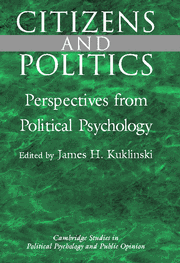Book contents
- Frontmatter
- Contents
- List of Contributors
- Prologue: Political Psychology and the Study of Citizens and Politics
- PART I AFFECT AND EMOTIONS
- Introduction
- 1 The Role of Affect in Symbolic Politics
- 2 Emotions and Politics: The Dynamic Functions of Emotionality
- 3 Cognitive Neuroscience, Emotion, and Leadership
- 4 Emotion as Virtue and Vice
- PART II POLITICAL COGNITION
- PART III POLITICAL ATTITUDES AND PERCEPTIONS
- PART IV POLITICAL VALUES
- Index
- Titles in the series
4 - Emotion as Virtue and Vice
Published online by Cambridge University Press: 07 October 2011
- Frontmatter
- Contents
- List of Contributors
- Prologue: Political Psychology and the Study of Citizens and Politics
- PART I AFFECT AND EMOTIONS
- Introduction
- 1 The Role of Affect in Symbolic Politics
- 2 Emotions and Politics: The Dynamic Functions of Emotionality
- 3 Cognitive Neuroscience, Emotion, and Leadership
- 4 Emotion as Virtue and Vice
- PART II POLITICAL COGNITION
- PART III POLITICAL ATTITUDES AND PERCEPTIONS
- PART IV POLITICAL VALUES
- Index
- Titles in the series
Summary
“Passion is a sort of fever in the mind, which ever leaves us weaker than it found us.” This statement was written by William Penn in 1693. It echoes a theme that has been persistent in Western thought from the Enlightenment to the present: that progress depends on the triumph of reason over emotion. Consistent with that theme is the democratic faith that, guided by rational discourse, an informed people can find liberty and justice. Traditional models of political judgment reflect a similar stance. They generally assume a hypothetical citizen characterized by passionless rationality who is engaged in reasoned action (e.g., Downs, 1957; Ferejohn and Fiorina, 1974; Riker and Ordeshook, 1968). However, there seems to be a growing realization that theories built around idealized decision makers may need revision. Part of the appeal of political psychology is the promise it holds for understanding the contribution of emotion to these processes.
The three excellent chapters on emotion and politics in this volume each address this theme. All three offer powerful and compelling explanations of the phenomena they treat. We found them to be impressive from any standpoint. They each ask crucial and difficult questions about the possible mechanisms of emotional influence. They also do a convincing job of drawing inferences from the cognitive and biological levels all the way to voter behavior. Masters, for example, places his research on the emotional reactions to photographs of political leaders in the context of neuroscience and finds in it practical implications for conducting elections.
- Type
- Chapter
- Information
- Citizens and PoliticsPerspectives from Political Psychology, pp. 103 - 124Publisher: Cambridge University PressPrint publication year: 2001
- 6
- Cited by

